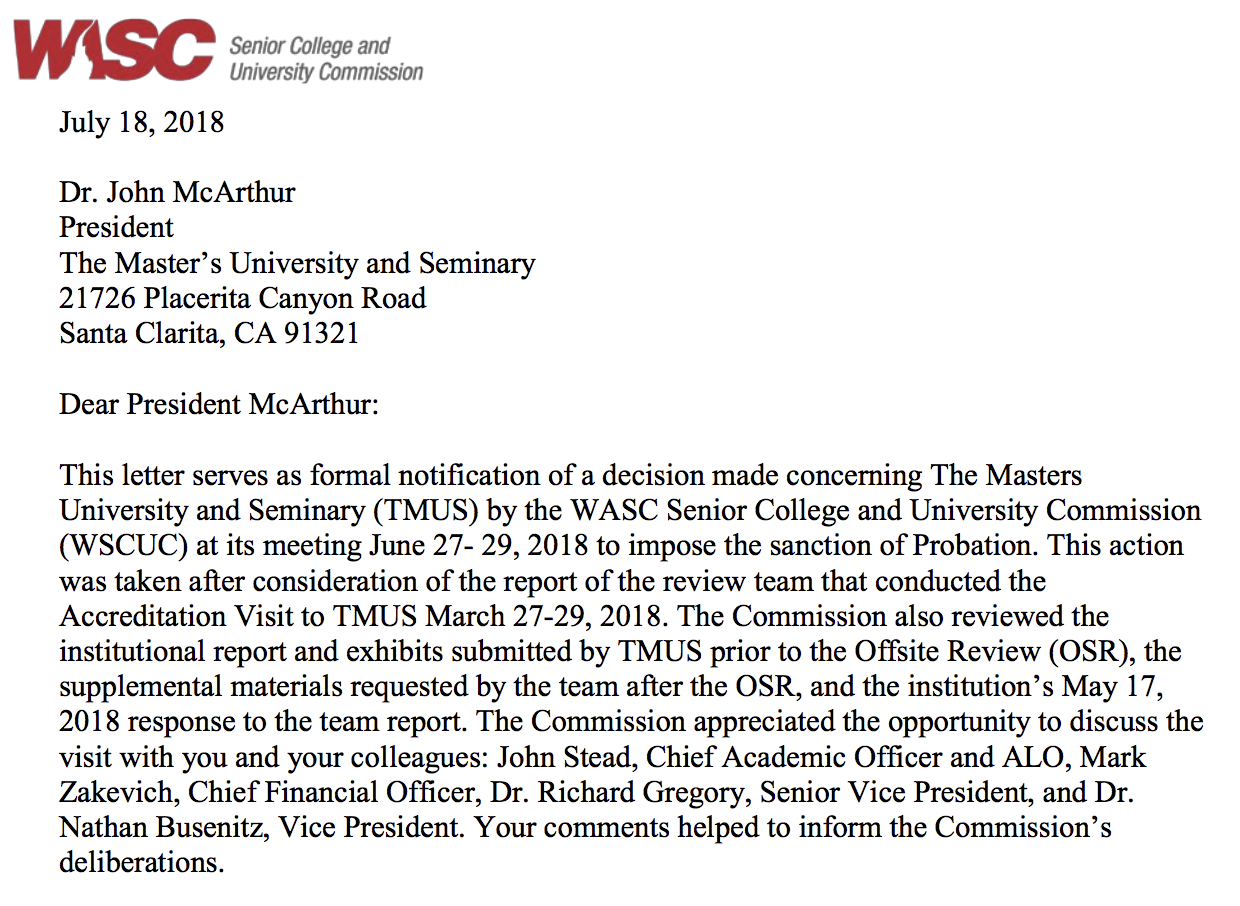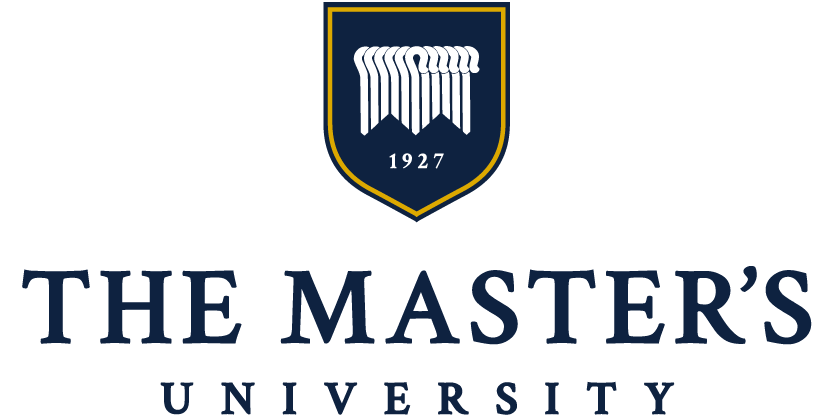Masters University, the school associated with Grace Community Church and the esteemed John MacArthur, has been placed on probation by the Western Association of Schools and Colleges (WASC). According to WASC, there are a number of deficiencies that Masters must improve upon for them to come out from under their probationary status.

Reportedly, the four areas of concern for WASC include board independence, personnel and management practice, operational integrity and leadership. Chiefly, the greatest cause of complaint, as stated by WASC, is included below:
“The institution does not meet the WSCUC requirement for governing board independence since many members of the Board are employed by the institution or another organization for which the president has authority.
There was a concern by the accrediting agency that Dr. MacArthur apparently wields too much power (so they think) because trustees of the board are also a part of the church, of which Dr. MacArthur is pastor. Before anyone accuses Masters of anything sinister (too late, the survivor blog gals are all over it), the problem for WASC is that board members at Masters belong to or serve Grace Community Church in some other capacity. This should be expected in an educational institution that is associated with a church. The only other solution is to have Masters guided by people not held accountable in some degree by the church (which is accountable to elder leadership that includes Dr. MacArthur). In reality, there are many hundreds (if not thousands) of church-associated schools and colleges whose pastors also serve as president, dean or director and whose board members serve the associated church. This is hardly scandalous, but for WACS it appears to (suddenly) create a conflict of interest. There seems to be quite a disparity here between how Masters is being treated by WASC and other accredited institutions that operate in similar common-sensical ways. I’ll remind you that Masters has been operating this way for decades, without concern by WASC until now.
WASC also questioned whether or not MacArthur’s son-in-law, who is an administrator for Masters, has given contracts to friends or acquaintances and, if so, whether or not that was appropriate. Likewise, Warren Throckmorton reports that a finding demonstrated a sizable amount of money was transferred from affiliate ministry, Grace to You, to businesses owned by MacArthur’s son-in-law. Of course, if work was done and payment was given for services rendered, one must again wonder what is the controversy. Doing business with friends and family? Forsooth! Somebody, call the cops.
The school has two years to fix the perceived conflict of interest issues. Other issues at Masters, according to WASC, include:
1. A lack of “academic freedom.” It seems that certain instructors have had their employment terminated for being theologically unsound. And might I add, praise God. Does a church-affiliated school not have a right to fire people they perceive to be theologically unfit? Mercy.
2. Not enough “diversity” in employment positions and among leadership. In other words, there aren’t enough women, according to WASC. Again, and this is going to make the survivor blog gals incensed, but…gooood. This is a church-affiliated school that (I’m sure) doesn’t believe in women teaching doctrine, at least in certain circumstances. Likewise, there’s surely a healthy crossover between leaders in Grace Community Church (which is male) and leadership in the church-affiliated university. WASC also requested “a broader dispersion of women’s perspectives through the curriculum.” Pfffft. No.
3. Too many faculty members attend Grace Community Church, which means – according to WASC – MacArthur has an inordinate amount of (perceived) control. Although colleges and schools may be affiliated with other organizations (in this case, Grace Community Church or Grace to You), they must be independent. You long-time P&P readers will remember this when we covered Lousiana College losing their Southern Association of Colleges and Schools (SACS) accreditation and their assertion that David Hankins of the LA Baptist Convention was exercising too much power and control. In that case, however, David Hankins was not the president of the college, but of a Baptist state convention. In the case of Masters, the accreditation entity has gone one step further; while it makes sense the president of another institution shouldn’t have “foreign power” over the school, it makes zero sense to claim the president of the school shouldn’t have influence over the school. That’s bizarre, and it seems to be designed to penalize Dr. MacArthur for being both a pastor and an administrator of an educational institution.
There were also some other issues, like a request that retention and graduation rates be made more accessible on the website (they’re already accessible, but WASC wants them more accessible, whatever that means), to be clearer when and how they’re raising or lowering tuition, and an accusation they had overheard that children of donors get better institutional financial assistance (I’m pretty sure that’s true everywhere).
There was also an accusation, which the survivor blog gals have made much of, that employees haven’t felt comfortable “speaking out,” even though WASC explicitly acknowledges that Masters has a whistleblower policy in place. I presume these are probably the theologically unfit ne’er-do-wells who confused their Masters teaching gig with a NEA union-supported and tenured public teaching position. Who knows?
If you read the reports from WASC yourself (we linked them above), you’ll see that they didn’t make any clear accusations, but asked questions that need to be resolved. Far from being concerned about the institutional integrity of Masters (or the personal integrity of Dr. MacArthur), I’m far more concerned about the accreditation integrity of WASC. Is it simply unfeasible for a college’s president to also be a pastor where the majority of employees and students attend? From the WASC report, it seems that alone is enough to accuse the institution of lacking boundaries, autonomy, and integrity.
And for the sake of quality religious education in America, that’s a problem.
[Editor’s note: Contributed by JD Hall, HT Warren Throckmorton]












